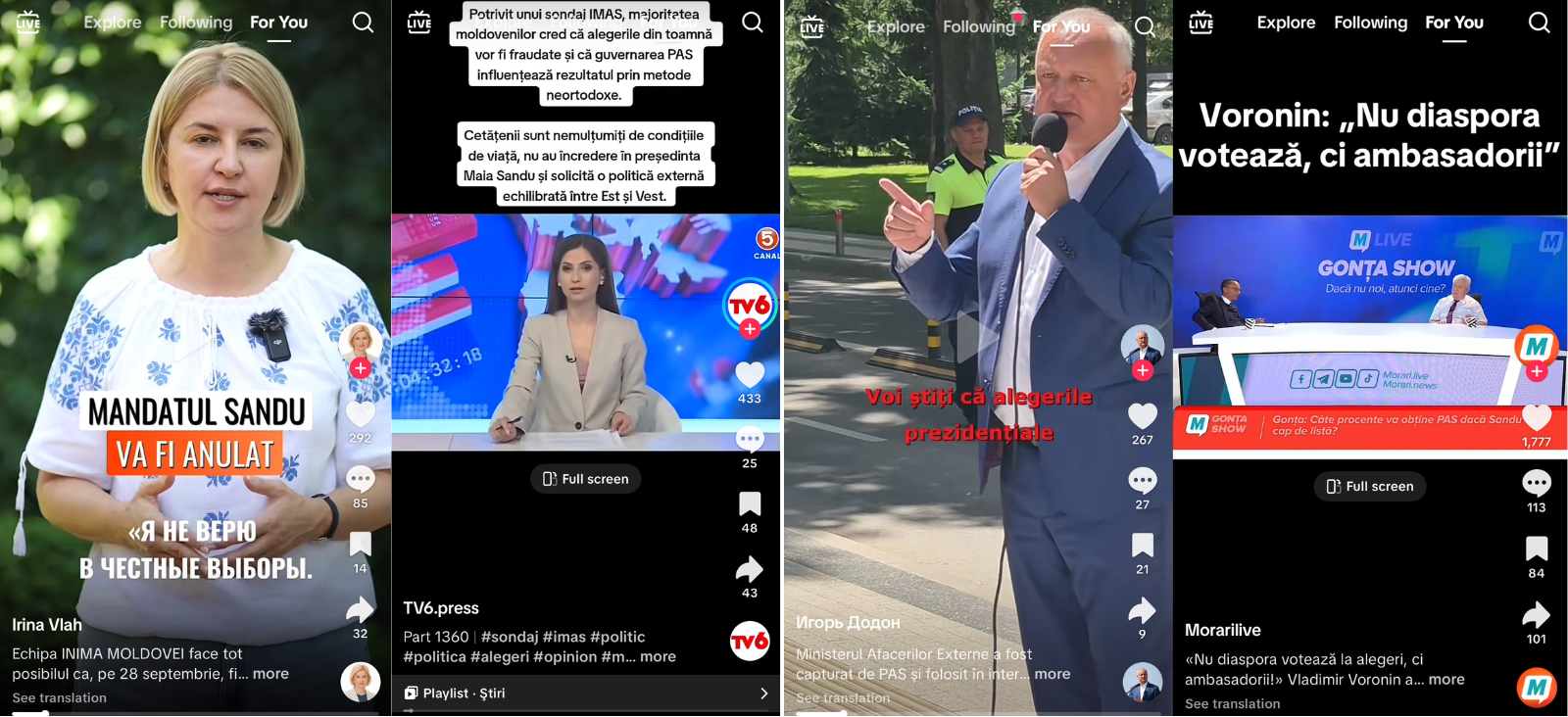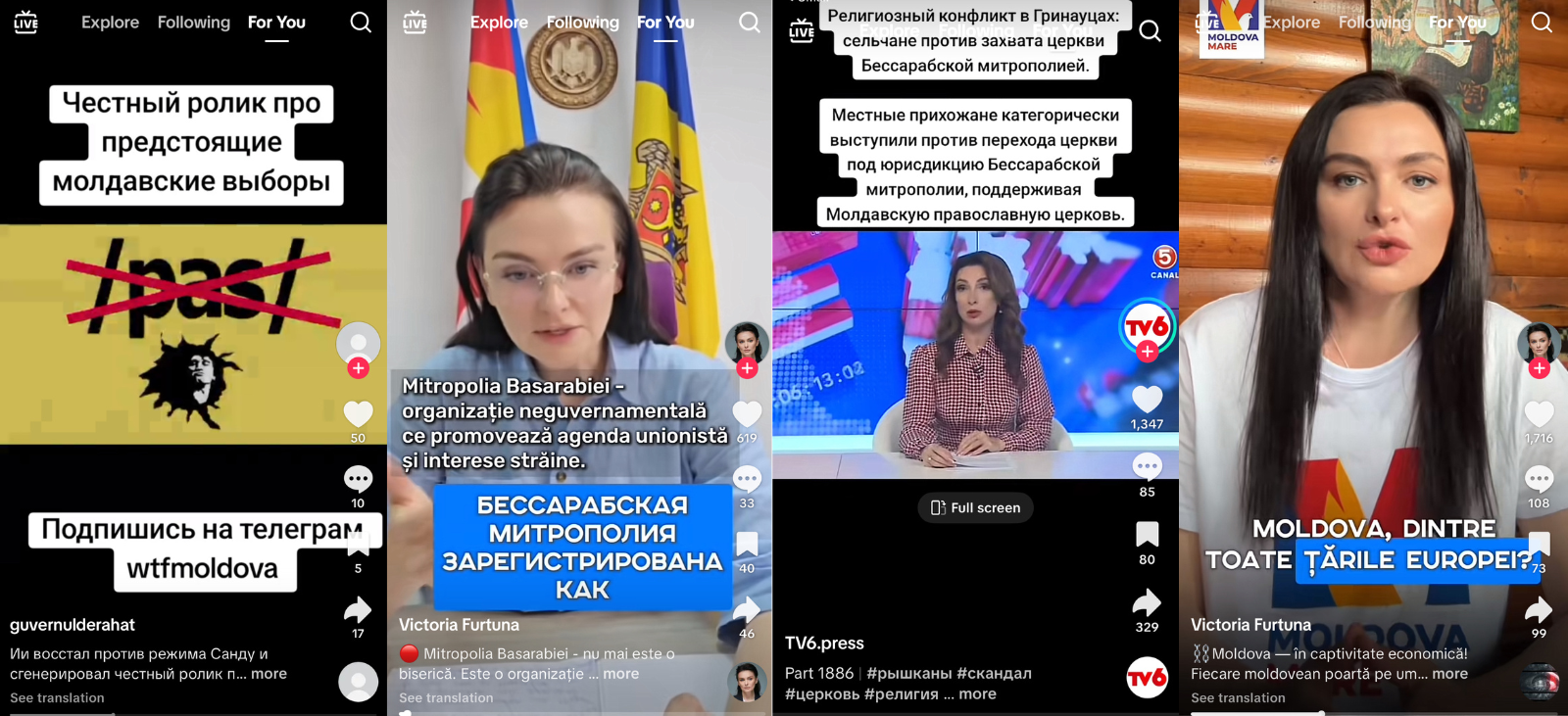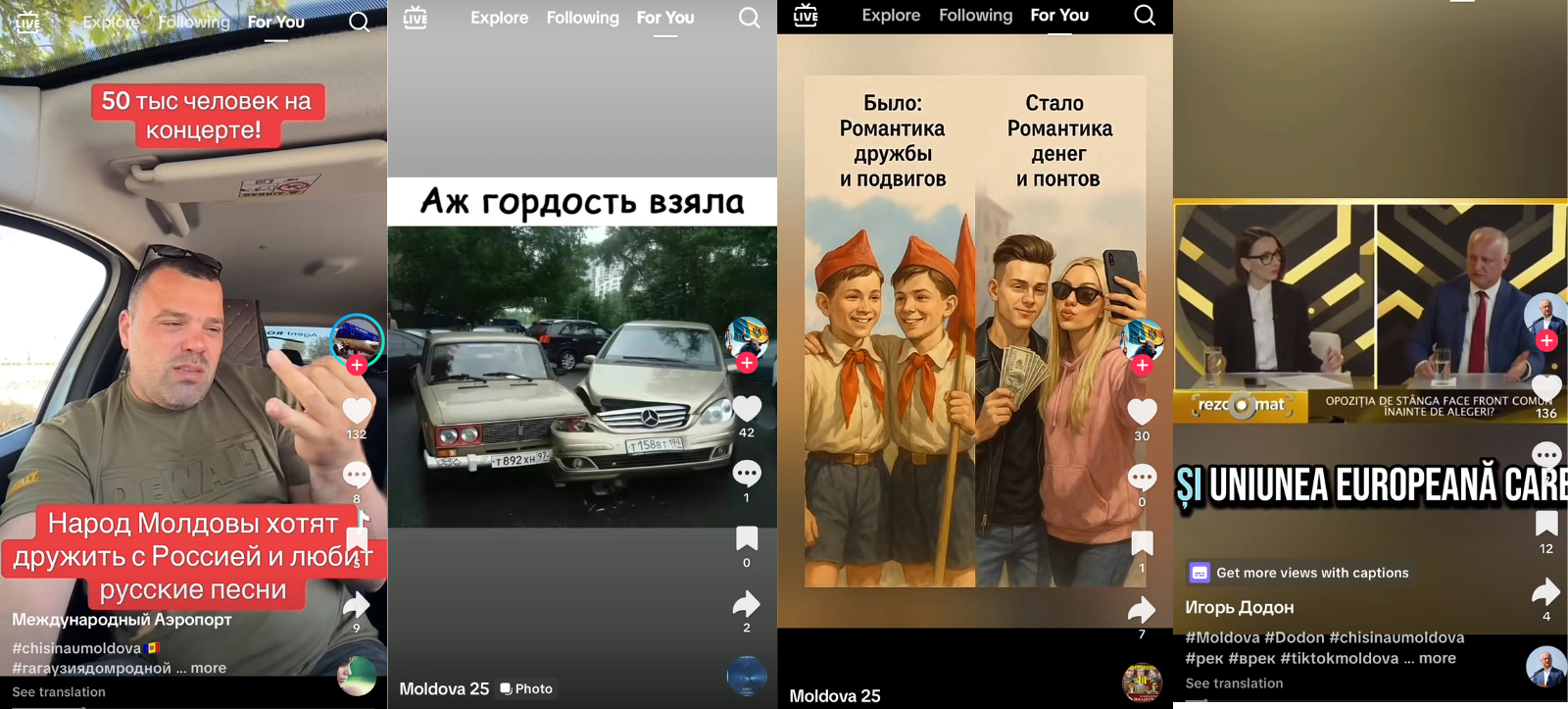Disinformation narratives on TikTok in pre-electoral context: Conspiratorial propaganda, anti-Western rhetoric, and state delegitimization

Many TikTok channels in the Moldovan information space publish daily videos with manipulative, false, or distorted content, using emotional language, irony, deepfakes, and conspiracy theories to promote recurring disinformation narratives against the EU and NATO, the current government, or the war in Ukraine.
- The monitoring of 51 channels belonging to various politicians, bloggers/influencers, media sources, or anonymous authors, carried out between July 1 and 15, has shown that many of them publish on a daily basis up to a few dozen videos with harmful content and have reached an extensive audience, with over 42 million views in just two weeks.
- This online hyperactivity contributes to the creation of a toxic information space, in which disinformation circulates virally and can hardly be countered in real time. But the impact becomes even more significant in the context of the upcoming parliamentary elections.
WHICH CHANNELS WE MONITORED
The content shared on 51 TikTok accounts was analyzed, of which:
- 10 held by politicians;
- 15 held by bloggers/influencers;
- 13 anonymous accounts;
- 13 accounts of media sources.
Some of the most popular accounts of politicians are the accounts of Renato Usatîi, with over 212,000 followers and 90 million views; Igor Dodon, with over 95,000 followers and 27 million views; and Irina Vlah, with over 71,000 followers and 30 million views.
Among bloggers/influencers, Grigore Manoli has over 442,000 followers and over 386 million views; Caras has over 175,000 followers and more than 145 million views; Sandeluu has over 168,000 followers and over 61 million views.
The most popular anonymous accounts we have monitored are: @fantastic10007, with over 143,000 followers and 86 million views; @.alpha2betaomega, with over 106,000 followers and 37 million views; @poseidon_008, with over 66,000 followers and over 114 million views.
The most popular media sources we have analyzed are TSV Pridnestrovie [ТСВ Приднестровье], with over 266,000 followers and over 10 million views; TV6, with over 210,000 followers and over 294 million views; Pervyi Pridnestrovskii [Первый Приднестровский], with over 60,000 followers and over 37 million views.
We hereinafter analyze the most prominent narratives present in the content shared by the monitored channels:
- Criminal government and captured state. Disappointment with the country’s leadership and distrust of institutions
This narrative brings together a variety of themes: the hard life of pensioners, the problems of farmers, police abuses, price increases, and suspicions related to the government’s proximity to the European Union.
A topic exploited in the analyzed period was the increase of the retirement age for women to 61 years and 6 months, starting with July 2025, according to the gradual increase calendar established by authorities until equalization with that of men in 2028. Alexei Lungu, a politician affiliated to Ilan Șor, mentioned in a video, “From July 1, the criminal group PAS decided to raise the retirement age,” suggesting that women will die before they get to receive a pension.
The same narrative appears on the anonymous channel @fantastic10007, followed by more than 143,000 users. One man nostalgically evokes the USSR: “In that USSR, women retired at 55, I think.” The message, although apparently personal, distorts reality by lacking historical context. The channel also shared the case of a farmer without help in agricultural work, accompanied by generalizing statements such as “the labor force has reduced by 90%.” The topic of agriculture is also widely exploited by politicians, often being used as a weapon to attack the European path of the Republic of Moldova. In one of the videos shared by Igor Dodon, the leader of the Party of Socialists, his colleague Bogdan Țârdea says that the EU promised money for Moldovan farmers in the autumn, but it gave “not a single leu.”
Irina Vlah’s videos on this subject have a more aggressive and populist approach, suggesting that Moldova “has always been an agrarian country,” and today “parents go to the market to buy fruits and vegetables for their children and leave at least 500 lei there.” Irina Vlah also says, “If our foreign policy had been built with citizens’ interests in mind, our production would have been the most competitive.”

The alleged activity of the Government to the detriment of the Republic of Moldova is one of the most widespread narratives among politicians and bloggers who seem to be affiliated with them. Most often it is suggested that the rulers of the state work in the interests of “their partners”, who lead and control them. This, for example, has been mentioned by Victoria Furtună, leader of the Great Moldova Party, or by the blogger Gabriel Călin, the latter stating that Moldova needs “a balanced foreign policy, not a diplomacy of servitude.”

Another channel – @.alpha2betaomega, a Canadian-based account with more than 106,000 followers – had a Russian speaker launch conspiratorial-style questions about the usefulness of state services, suggesting that citizens should no longer contribute to pensions, because “many will never benefit from them.”
The police are frequently portrayed in a negative role, either through tense interactions with street vendors or in connection with the proposal of the chief of the General Police Inspectorate to increase the salaries of police officers to up to MDL 35,000. A clip on @fantastic10007 scoffs at the idea and questions the large number of police officers, suggesting inefficiency and favoritism. The dominant feeling is that of frustration and distrust of the authorities and their priorities.
The TikTok account @costa.moldovanca often turns to conspiracy theories and mentions that “some people who work in state institutions, which must ensure the neutrality of this country, are part of Masonic lodges,” also making reference to the Security and Intelligence Service Director Alexandru Musteața.
Most often, public institutions are accused of being subordinate to the ruling party, and the country is allegedly captured. To make this point, Alexei Lungu always uses the label of “criminal group” when addressing the Action and Solidarity Party (PAS).
At the same time, @ninadimoglo claims in a video filmed on the occasion of the end of the term of the current Legislature that all power in the country is in the hands of one person, and the abuses of the authorities are masked with integration into the EU. The same post mentions censorship of the media or freedom of expression, persecution of the opposition and – “the icing on the cake,” according to the author – declaring the Russian Federation as the main enemy of the Republic of Moldova. The same narratives are repeated by @costa.moldovanca and @aviktor_force, the latter trying to maintain a de facto neutral position in two other posts made on the occasion of the same event: the removal or reduction of democracy, the censorship or closure of the media, and the destruction of relations with the Russian Federation.
- Parliamentary elections will be rigged
Distrust of the government extends to the electoral context as well. In a news broadcast by TV6 (channel with over 210,000 followers) about an IMAS poll, information is presented selectively to amplify distrust in the electoral process. In some phrases, the research is presented as an alleged proof of speculative conclusions: “According to the study, the authorities will influence the outcome of the elections by unorthodox methods; foreign politicians will be involved and transport for voters will be organized.”
The narrative of the rigged elections is widely promoted by politicians, too, especially by Irina Vlah, who dedicated several videos to this topic. The politician has stated repeatedly that the 2024 elections were rigged with the help of the diaspora, and the same will allegedly happen in 2025. She also says she will conduct an investigation, re-examine the results of the 2024 election, and punish the culprits. Igor Dodon claims that “the Ministry of Internal Affairs ensured massive election fraud in the diaspora.” In another video shared by the PSRM leader, a man said that “diplomatic bags with already stamped ballots were sent to the diaspora.” None of the facts alleged about last year’s presidential election have been proved.
In the same spirit, @ninadimoglo suggests in one of her videos that the authorities, through unconstitutional methods and secretly, “change the rules” during the game to manipulate the election results.

In a fragment from an interview with Vladimir Voronin at Gonța Show, broadcast on @morari.live (channel with over 33,000 followers), when asked by the moderator whether the diaspora will save PAS again, the leader of the Party of Communists says that “it is not the diaspora who votes, but the ambassadors,” insinuating that the results of the diaspora vote are manipulated by diplomats. He cites examples from the past, suggesting that Maia Sandu’s victory was allegedly “saved” by the vote from abroad through ambassadors. In the same interview, he questions the legitimacy of the diaspora, outlining a conspiratorial framework and saying that the term “diaspora” must be clearly defined in the law to stop the manipulation of votes of citizens abroad for political purposes.
In a fragment from another episode of Gheorghe Gonța’s show, broadcast on @morari.live, the guest Victor Pogolșa declares that “the electoral process is compromised,” claiming that “the governing party arranges everything in such a way as to regain the majority.” This opinion fits in a conspiratorial framework, which detracts from the legitimacy of future elections.
- Messages of social division and discrimination
Many of the narratives promoted are interconnected, and dissatisfaction with the government is often associated with themes of social division and discrimination. A recurring direction on anonymous channels is the attack on the LGBTQ+ community, often by associating the governing party with the parades and concerns of this community, presented as evidence of a lack of real priorities.
The channel @guvernulderahat, many of whose posts are generated or manipulated with artificial intelligence, frequently publishes videos with disparaging lyrics and homophobic overtones. For example, a clip includes the message “PAS, do not vote PAS, because Recean is a fag.” The term is pejorative and is used as an attack on the person, with the aim of discrediting politicians by associating with a sexual orientation that is negatively perceived in society – an explicit form of homophobia unrelated to public policy.
Another narrative line related to social divisions appears in the case of the priest from Grinăuți, Rîșcani district, who decided to switch the church from the Metropolis of Moldova to that of Bessarabia. A piece of news published on TV6 channel shows us a biased context on the events, with the aim of discrediting the Metropolis of Bessarabia and the Romanian state. The source presented the subject in an unbalanced and tendentious way, suggesting that the Metropolis of Bessarabia is acting aggressively and that change has been imposed. Neither the priest’s reasons nor the support received from some parishioners were mentioned. One interviewed local woman says, “We want to know, since when was the church sold? Since when did it switch to the Romanians, since when?” These statements, while genuine, are presented selectively and tendentiously to amplify the narrative of illegitimate cession of church property.
This news is also exploited on the channel @fantastic10007. The person in the video appeals to the idea that someone allegedly wants to divide Moldova and that even the religion and faith in God are under attack. “Wake up to reality, or people will lose faith in God, too.”
Victoria Furtună also says in one of her posts, “The Metropolis of Bessarabia is a non-governmental organization and has become a political tool openly used in geopolitical games and a propaganda of unionism.” The politician also suggests that the Metropolis aims to destroy the pillars of our national identity, being supported by “those who fight against the Moldovan language, the faith and the memory of our ancestors.”

Victoria Furtună also promotes a narrative from the series of those about the “foreign agents’ law”, but targeting NGOs or the media. The politician claims she will create “national registers of recipients of foreign funds” and demand “the liquidation of all international monitoring organizations that operate outside the Constitution, outside the control of the people.”
The blogger Gabriel Călin develops the same idea, noting that he will do “everything possible for the foreign financing of the media to be banned and so that we will no longer have NGOs that get involved in politics.” He also says that “globalists and Soros” decided that NGOs should write our laws, and “a combination of the foreign agents’ laws from Russia and the USA would be perfect for Moldova.”
4. Anti-EU narratives and delegitimization of European integration: Loss of neutrality and a country governed by foreigners
The EU-Moldova summit of July 4 generated a wave of manipulative content on TikTok, used to challenge the intentions of Moldova’s rapprochement with European institutions. An example is a video manipulated with artificial intelligence, in which local and European political leaders appear to be “dancing” in chairs. The comment accompanying the images insinuates that the entire meeting may have been a “rehearsal” to fool the audience. The message is that politicians play roles and European integration is just a façade.
On the channel @shoknews.inform, another clip shows diplomatic convoys in Chisinau, accompanied by the text: “The Masters have come”. This message reinforces the narrative that Moldova is not led democratically, but directed from outside by Western powers. Integration into the EU is thus associated with the loss of sovereignty.
In the context of the visit of EU representatives to Chisinau, Igor Dodon wonders, “What about neutrality and sovereignty?”, and the protagonists of the same video claim that Moldova is “governed by foreigners” and “the official policy of the EU is the anti-Russian and homophobic course.” At the same time, it is suggested that the EU imposes an anti-Moscow policy in Chisinau, which “destroys Moldova’s economy.” In another video, Igor Dodon propagates a generous “bouquet” of manipulative anti-EU narratives: “The EU is in a deep crisis of legitimacy now” and has become an undemocratic entity because it cancels elections, bans parties, and persecutes political opponents through “controlled justice.”
The politician mentions that the sanctions against Russia “hit the EU economy to the ground” and “everyone understands that there is no more economic prosperity in the EU.” Another message – even more serious – spread by Igor Dodon is that “the EU is turning into a military bloc” and uses Moldova only as an instrument in its geopolitical struggle against Russia. The same idea is shared by other bloggers and politicians, such as Alexei Lungu, Vasile Tarlev, Gabriel Călin, or @costa.moldovanca.
Igor Dodon’s account also promoted a video with disinformation narratives of Alexander Lukashenko, the Belarusian ruler. “No one is waiting for you anywhere,” he said, insinuating that European integration will destroy Moldova’s economy.
Victoria Furtună propagates the same anti-EU ideas, although she tries to take a centrist stance. She says that “integration must be delayed” and notes that EU sanctions are a method of persecuting politicians: “Is that the new voice of Free Europe?” Another narrative promoted by Furtună, but through the prism of the “voice of the ordinary people”, is that emigration to the EU is a form of humiliation and modern slavery: “You are a foreigner. You are a slave there.”

Victor Tarlev mentions in his posts that the EU is turning a blind eye to “serious violations of democracy” in our country and, in order to strengthen PAS, “some European partners tolerate censorship and repressions against the opposition” in Chisinau.
The account @costa.moldovanca, again turning to conspiracy theories, claims that the EU and politicians in Chisinau earn money on account of the high prices paid by ordinary Moldovans for energy.
A more subtle message, but outlining the same idea, comes from a guest of Gheorghe Gonța, who says, “Moldova is going into the blue.” It is an unfounded generalization that offers no solution or direction, but only reinforces the idea of stagnation and lack of future. “Our country, in order to go somewhere, we must not hold the begging bowl out to the West or to the East” – this statement emphasizes a sense of uselessness and dependence on an external force.
In another video on the channel @fantastic10007, a man tells us about the beauty of the Moldovan villages, which, despite being quiet and deserted, with abandoned houses and lack of people, offer a rarely found peace and tranquility. He points out the contrast with European streets, where on every corner you can find pharmacies and banks, indicating that people there are “indebted and sick”. In Moldovan villages, on the other hand, there are no pharmacies or banks, because, according to him, people eat healthy and have no debts.
- Anti-Romanian sentiments
Skepticism about the benefits of European integration is often accompanied by anti-Romanian narratives, designed to undermine confidence in the relationship between Chisinau and Bucharest.
A news story broadcast by TV6 cites an article from the Romanian platform Gandul.ro, allegedly saying that “Bucharest financed the Moldovan media to support Nicușor Dan and discredit George Simion” in the presidential election. The video goes further, stating that the editorial policy of the Moldovan media is “dictated by Bucharest with the consent of the official Chisinau.” This insinuates a government complicity in a media manipulation scheme.
On the @pravdamoldova25 channel, a video compares images of Romanian President Nicușor Dan and Russia’s Vladimir Putin, both in interaction with the military. While the Romanian president goes through a usual greeting ritual, the Russian one insists on shaking hands with the military. That contrast favors Putin, who is suggested to have a closer relationship with the military.
Another event that fueled anti-Romanian sentiments was the ban on entry into Romania imposed on Ion Ceban. In a video posted by @fantastic10007, one commenter claimed the decision was a “coup de grace” orchestrated by Maia Sandu to politically compromise Ceban and weaken his electoral base. The same source claims that “Nicușor Dan returned the debt to Maia Sandu” for the support offered earlier in his electoral campaign, insinuating foreign political interference and a network of influence between Bucharest and Chisinau. Through such examples, Romania is presented as a manipulative factor, the relationship with Bucharest being harmful or illegitimate for the sovereignty of the Republic of Moldova.

- Nostalgia for the Soviet past and promotion of rapprochement with Russia
Criticism of the government and European integration is often accompanied by nostalgia for the USSR and messages favorable to rapprochement with Russia.
In a video, a man claims that “80-90% of Italians are against Brussels” for the reason that the EU “has broken its promises”, “gay-ed” Europe, and is responsible for the war in Ukraine. Russia is presented as a bastion of traditional values, and Putin allegedly “endured too much” since 2014.
In a discussion with a woman from Bravicea, in another video, they compare the current agricultural work, for MDL 400 per day, without water or food, with the Soviet times, when workers were brought a “cart with cold water” and “children from the school brigade drank water from one cup.” The speaker criticizes the European Village project, arguing that despite investments in infrastructure, people have no jobs.
The concerts of Russian artists invited to Chisinau by Renato Usatîi were also commented. In a video posted on an anonymous channel, the speaker suggests that “the people of Moldova want to be friends with Russia and love Russian songs.” It shaped the message that the Russian culture unites, given what he saw at the concert: “I realized that there were no divisions: no Russians, no Moldovans, no Romanians, no state language, no Ukrainians, but everybody just stood and listened.”
An image published on the @pravdamoldova25 channel shows a Lada car, which “seriously damages” a Mercedes car, without the Russian car being scratched. It is thus insinuated that Soviet products were durable and qualitative as opposed to the “illusion” of Western welfare.
In another post on the same channel we are presented with a series of images comparing Soviet youth with youth of the current generation, with the emphasis that the choices of Soviet-era youth were better and healthier. For example, one of the images shows young people in pioneer uniforms, with serious and determined expressions, in contrast to modern young people who take selfies and seem “less serious”. The caption is also suggestive: “USSR vs now. Where has true youth gone?” These comparisons represent negative associations and speak of an idealized past and a fallen present. They ignore historical and social contexts in order to suggest that life was better “in the time of the USSR” and that Russia today represents the continuity of that model.
Some politicians in Chisinau openly promote a pro-Russian course of the Republic of Moldova, although they often mask it as “good relations with all.” Igor Dodon, for example, calls the dialog with Russia a “national interest”. He also says that “the EU understood that it must develop a dialog with the Russian Federation,” suggesting that Moldova should do the same. Curiously, the next day, the politician shared a video about Russophobia in the EU, which is allegedly imposed on Chisinau. The advantages of friendship with Moscow, presented by Igor Dodon, Irina Vlah and Vasile Tarlev, among other people, are cheap energy resources.

- War in Ukraine
Narratives about the war in Ukraine promote ideas designed to undermine support for Ukraine and cultivate resignation to the conflict.
A video on the anonymous channel @fantastic10007 shows a fragment from an interview on the YouTube channel of Diana Pancenko, a Ukrainian journalist, promoting Kremlin propaganda about the war. In the interview with Colonel Davis, an American military man who has a skeptical position towards the support of Ukraine by NATO and the US, the theory of unification of the armies of Ukraine and Russia is discussed. The narrative is speculative, based on an impossible scenario, to illustrate the absurdity of the conflict or to highlight the need for negotiation.
The channel @.alpha2betaomega explains in a video that it has the “solution” to stop any military conflict in just 24 hours, but stresses that this “will never happen” because the interests of those in power are other than this. The speaker says that ordinary people are “injected” with patriotism and the idea that “someone wants to take something away from them”, prompting them to give their lives willingly in war. Although the expressions and language are vague, the idea that Ukrainian patriotism is useless is emerging.
A guest of Gheorghe Gonța also comments on the war narrative, saying that the fear of war is unfounded in Moldova. The interlocutor states that he has never heard of Russian intentions to invade or affect Moldova and calls the fear of a possible Russian invasion “stupidity” and “artificial fear”.
On another anonymous channel, a single video that has accumulated more than 222,000 views disinforms about Moldova’s involvement in the war: “Our soldiers have already been sent to Ukraine, the consequences are tragic, Moldovan soldiers have died. They die, and their relatives are forced to sign papers about the non-disclosure of this information.”

CONCLUSIONS
1.Intensification and diversification of anti-government narratives in electoral context
The monitored period (July 1-15) illustrates a significant mobilization on TikTok of political, media, and anonymous channels around conspiratorial and anti-government themes. They aimed to undermine public trust in state institutions and the electoral process, constantly suggesting that Moldova is a captured state and the upcoming elections will be rigged.
- Convergence of anti-Western and nostalgic pro-Russian narratives
Anti-EU and anti-NATO speeches are recurring, often associated with promoting a nostalgic outlook towards the USSR and rapprochement with the Russian Federation. European integration is portrayed as a form of loss of sovereignty, while Russia is portrayed as a traditional ally, protector of genuine values.
- Exploitation of social, cultural, and religious cleavages
Actors in this information ecosystem manipulate on topics such as religious identity, sexuality, NGO status, and ethnic affiliation to produce social division. Homophobic and anti-Romanian messages are propagated in a narrative framework aimed at internal division.
The monitoring was carried out within the project “Resilient Media, Informed Voters: Safeguarding Moldova’s Elections from Disinformation”, funded by the Embassy of the Kingdom of the Netherlands in Moldova. The views expressed are those of the authors and do not necessarily reflect the position of the donor.
Access to the TikTok monitoring tool was provided as part of the project “ProElect – Promote accountability in Electoral processes in EaP through increased participation and capacity of civic actors” implemented by the Center for Research and Advocacy in European Affairs with the financial support of the European Union and Equal Rights & Independent Media (ERIM).
![]()



